-

Whales are safer today. John Carlson
It’s rare that animal abuse ends with one blow to the head. Typically, it takes a thousand strikes before the perpetrator—whether it’s an industry, a nation, or an individual—moves on. That’s been the case with all of the major breakthroughs in civil rights, women’s rights, and so many other important causes. Such is the case, too, with the movement to stop the commercial slaughter of the biggest animals, with the biggest brains, who have ever lived on the planet: the many species of whales that swim the world’s oceans.
Today, Japan sustained its biggest strike since the 1982 global moratorium on commercial whaling with a ruling by the International Court of Justice that its current southern ocean whaling activities are in breach of the International Convention on the Regulation of Whaling.
Support our efforts to stop commercial whaling and other wildlife abuse.
Humane Society International was the incubator of this idea, nearly a decade and a half in coming to fruition. But it found powerful and decisive expression in a 12 to 4 ruling of a court created under the authority of the United Nations.
Specifically, in 1999, HSI hatched an idea to challenge Japan at the International Court of Justice for its so-called scientific whaling programs. Japan has been violating the ban on commercial whaling since it first went into effect in 1986—by using a loophole in the International Convention on the Regulation of Whaling that allows countries to kill whales for scientific purposes. The majority of countries around the world including the majority of parties to the IWC—the body that regulates whaling—believe Japan’s science to be nothing more than commercial whaling thinly disguised as a scientific enterprise. Yet the IWC is unable to stop Japan because it lacks the ability to enforce the Convention’s rules.
We needed a new angle, a new point of attack. As our HSI team in 1999 prepared for the 2000IWC meeting in Adelaide, Australia—led by current vice president Kitty Block, they crafted a legal argument laying the foundation to take Japan to the ICJ for its ongoing whaling.
One hurdle was to find a country to bring the legal action. For a variety of reasons, we felt Australia was the right nation; we asked, and the Australian government accepted this important, bold challenge. That nation and our affiliate HSI-Australia, which won a significant legal victory against Japanese whaling companies a few years back, deserve a lot of credit on this historic day.
In the years since HSI’s whale campaigners forged this approach, the IJC case has been ripening, and today’s ruling marks the most important announcement in the trajectory of the anti-whaling movement since the IWC passed the commercial whaling moratorium 1982. It is the strongest third-party rebuke of Japan’s disguised commercial whaling program ever, and it has the force of international law behind it.
But, in the end, this is not a time to focus on which countries won and lost in this legal battle. It’s bigger, much bigger, than that. This is an inflection point in the decades-long battle over whaling, and an opportunity for Japan to join the rest of the worldwide community in valuing live whales over dead ones. There’s much more money to be earned, and more national brand building to be gained, by transitioning entirely to a responsible whale watching approach and leaving the commercial killing behind. Indeed, there is a growing whale watching industry in Japan, and this is the future.
The new, humane economy beckons. The nations of the world, the courts of the UN, and the lion’s share of global citizens want Japan, and other whaling nations, like Norway and Iceland, to join them in protecting whales and recognizing the beauty and majesty and sentience of these remarkable beings. Give now to support our work.
